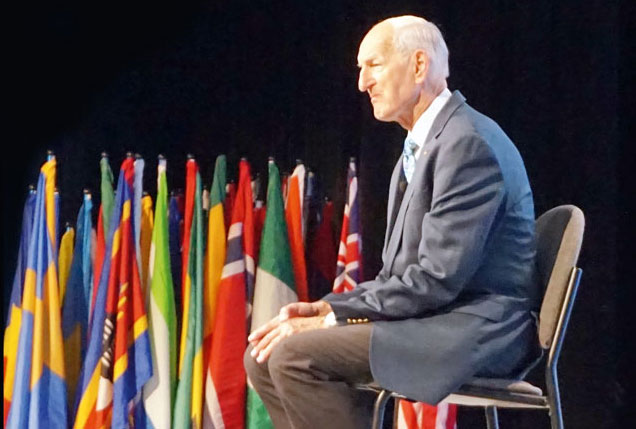When the international branding agency Siegel and Gale did a research study on major service and humanitarian organisations and certified Rotary as ‘unique’, “we asked them why and they gave us four reasons,” PRIP Bill Boyd disclosed while addressing the International Assembly in San Diego on ‘What makes us unique’.

One of the primary reasons was diversity; “they said that our classification system means that in our clubs we have members from many different businesses and roles and when we face an issue or a challenge, we bring a wide range of diverse experiences to ensure that we get the best answer. Diversity is important. We think differently.”
The second reason pertained to leadership; as most Rotarians were leaders in their own fields, they brought into Rotary meetings management and leadership skills. Also, Rotarians had “passion and perseverance”. The branding agency team attended several Rotary meetings and said that they could feel the underlying passion in every Rotary event they attended.
In our clubs we have members from different businesses and roles and when we face an issue or a challenge, we bring a wide range of diverse experiences to ensure that we get the best answer. Diversity is important; we think differently.
Rotary’s perseverance was at the forefront as it waged a war on polio. “To stay in the fight against polio for over 31 years for an organisation of volunteers is remarkable.”
But it was the fourth reason that really stood out for him, said Boyd. Being present in over 35,000 communities and most countries around the world, Rotarians, by sharing their resources with the communities around them, did something that was remarkable: Community Service on a global scale.
But apart from these qualities, what made Rotary unique was the personal qualities of each Rotarian, he said, recalling what the Prime Minister of Sri Lanka had said at the Seoul Convention last June: “We are grateful to have Rotary in our country, as a community with Rotary is better off in every way than one without it”.
He said this because in Sri Lanka, Rotary had brokered peace for a few days and that had enabled the children in the embattled north to be immunised against polio. “And it was Rotary which built 21 outstanding schools after the tsunami in a project that was one of the best managed projects I have seen. Past President K R Ravindran was involved in both.”
Rotarians not only believed that they could make a difference; they built their service on the friendships they made in Rotary. “We associate with people who think and feel as we do and collectively we are able to do more than we could ever do alone. Service is indeed our business and friendships mean better service.”
But to make the world a better place to live in, “we must be honest in our dealings with people. We cannot improve our communities if we do not respect people,” Boyd said. So honesty was an important value, as was being worthy of trust. Thanks to the latter, people trusted Rotarians with their children in Youth Exchange, Rotary Youth Leadership Awards and activity camps, as also their money, because they knew it would be used wisely. “Bill Gates knows this; the Bill and Melinda Gates Foundation has given us significant amounts of their money because they know that we will spend it properly and account for it accurately. Trust is something you build and Rotarians have built community trust over the years by being true to our values.”
If the values such as service, honesty, trustworthiness, unselfishness, goodness and principles were to be collated in one word, that word would be Integrity, he added.
There was one more thing that influenced Rotarians, Boyd said, recalling Saint Teresa’s words, “The biggest disease today is not leprosy or tuberculosis but rather the feeling of being unwanted, uncared for, and deserted by everybody.” Lack of love and charity were great evils, as also indifference to our neighbours, and at the hour of reckoning we would be judged by God not on how much we had, but how much love we have put into our actions, she had said.
Rotarians were not guilty of such terrible indifference and did not accept that people should feel unwanted and uncared for or that their lives had no value. They had come into Rotary because they wanted to serve others, show their care and affection through service to the community, he said. If for each Rotarian, Rotary meant “service, integrity and caring, then indeed we will change the world one person, one community at a time. We become Rotary — making a difference,” he concluded, touching upon RIPE Ian Riseley’s theme for the coming Rotary year.
Pictures by Rasheeda Bhagat





